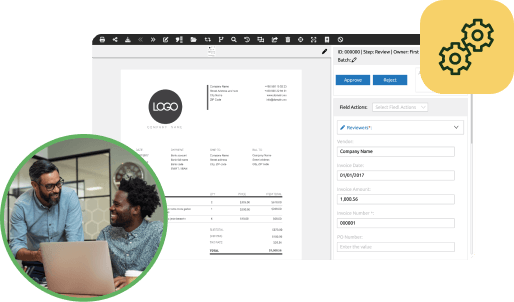
Wadih Pazos
Wadih founded both PairSoft and PaperSave. He is an avid technologist who specializes in streamlining operations and maximizing productivity.
View all posts by Wadih PazosWadih Pazos

Companies that do not embrace digital transformation in the near future might end up struggling to remain relevant in their marketplaces.
As such, let’s discuss digital transformation more deeply, and work to understand what steps need to be taken to achieve a successful overhaul of traditional business processes and operations.
The Massachusetts Institute of Technology’s Sloan School of Management published a piece on its blog that outlined what it sees as the more vital elements of digital transformation, breaking them down into three umbrella categories.
The post, which was written by George Westerman, Didier Bonnet, and Andrew McAfee, pointed out that organizations in virtually every industry need to be at least aware of the impacts this trend will have, but more so must face it head on to capitalize on its myriad advantages.
Here is the breakdown the authors offer:
Not all organizations will need to cover everything above, but the business process digitization element is increasingly vital regardless of the industry or size of a firm. A great place to begin these efforts is the accounting department.
ICAS published a blog post from Nick Huber, who outlined some of the key ways in which digital transformation is impacting accountants and accounting departments around the globe. Not surprisingly, the author began with cloud computing technology, which has been widely used in efforts to shift away from paper-based processes and toward wholly digital workflows.
Cloud-based management tools often come with lower upfront costs and much stronger interoperability with other systems, meaning that the transformation can take place without putting immense financial strain on the organization involved.
Huber also pointed to automation software as something that has truly benefited companies with respect to tax management and reporting, as well as transaction monitoring and other key components of accounting.
Finally, the accounting arena is beginning to benefit from mobile technology as well, as the author pointed out that many different service providers and solutions vendors have adapted to demands that call for mobile access to the tools and relevant data.
A truly digitized accounting department will tend to enjoy lower risk, greater efficiency and more consistent and predictable cash flow. Those advantages will in turn fuel a well-oiled machine across other departments.
As companies become more comfortable with these digital management technologies, they will often spread the programs out to cover a wider range of processes, tasks and functions.
When doing so, they will need to focus on their document management systems, ensuring that all of the pieces of software are working in concert. Because many of these projects involve the cloud, managers and leaders must know the general best practices involved.
The Nonprofit Technology Network explained that even the more basic elements of document management will need to be tweaked when migrating into the cloud and working to unify complex software environments.
For example, the organization stated that matters like folder structure and sharing must be adjusted to account for the differences between a cloud-based storage framework and one based in a legacy system. Sharing is a particularly important aspect here, and NTEN affirmed that policies must balance ease of access with control and security.
To do so, the group suggested focusing on the development of a tight, informed and seamless archiving strategy, then connecting that to standardized folder and file categorization models. This keeps all of the information across a business standardized, and channels of communication fluid for optimal user experiences.
When document management strategies are transformed within the company’s pursuit of digital operations, the firm will be better-positioned to truly capitalize on modern opportunities.
There are many moving parts involved in digital transformation. Regardless of the size or scope of an organization, it will need assurance that the digital transformation project is being orchestrated properly, and that the plan’s execution is likewise tight and consistent.
Because many businesses do not have large IT departments staffed with individuals who have tackled these projects before, managed services firms are playing an active role in this shift into the future.
In November, International Data Corporation’s Digital Transformation lead Bob Parker estimated that about $18 trillion will be generated by digital transformation projects in the coming years, and that means leaders in each organization need to be highly active in planning and execution every step of the way.
However, having the right support and guidance will be equally critical, which is why experienced managed services firms can come with so much value.
To learn how PaperSave can help your business capture, integrate and automate your business processes, feel free to watch our personalized demonstration or visit our case studies page to read about our clients’ success stories.
Get a free demo to learn how our tailored workflows have boosted the AP performance for organizations of all sizes.


Many organizations start with manual receipt handling, fragmented card feeds and slow AP processes. Implement AI agents to auto-capture receipts, route approvals, enable punch-out buys and post to the ERP.
Result: faster batching, fewer errors and cost savings. “This saves us hours every month.”
Many organizations face slow, paper-heavy AP and fragmented procurement that waste time and inflate costs. AI Agents can automate approvals, PO matching and record sync to improve speed, accuracy and control. Client quote: “It freed up hours and made our process reliable.”
Operational drag and rising costs slow growth: teams waste time on manual tasks, misaligned priorities and opaque processes. AI Agents help automate routine work and coordinate actions across teams. “We’ve lost time to repeats and handoffs,” says a typical client.
Companies struggle with manual procurement, fragmented approvals, and costly integrations that slow growth and obscure spend. Our AI Agents streamline requisitions, POs, and invoice matching to cut manual work and improve visibility. “We were wasting time and missing insights,” says a client.

Many teams start with fragmented PO/AP systems, manual matching and delayed financial reporting. Deploying AI agents to automate PO checks, real-time encumbrance tracking and invoice matching reduces processing time and errors, delivering live budgets and faster closes. “Finally, we can see current balances and approve instantly.”
Many companies juggle growing invoice volumes and legacy systems. They struggle with manual processes, compliance gaps and limited headcount. Our AI Agents automate integrations, enforce rules and surface exceptions. The typical outcome: faster closes and measurable ROI. “We stopped chasing invoices.”